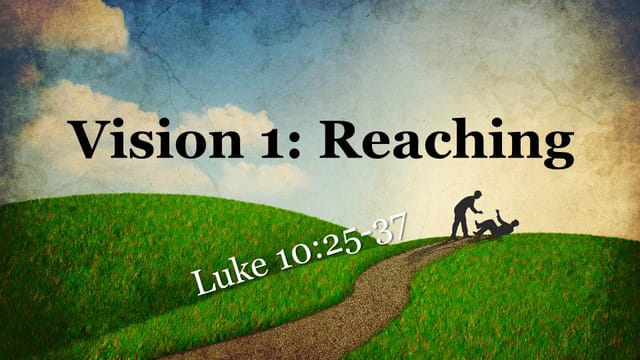
Pastor Patrick Jensen brings us today's message: "Vision I: Reaching"
Luke 10:29-37 NKJV
I. Introduction:
a. The Case of Mr L.
b. The Case of the Unknown
c. The Case of Mr. J.
II. Reaching Begins When we Consider the Wounded as Neighbor (Luke 10:29).
a. There is a stigma in the Western church that ignores that there is pain, illness, wounds, and suffering.
b. This is more striking as we consider illness that is mental or emotional, substance oriented or poverty induced. We often stigmatize this problem as one may be less spiritual than the one not suffering, or we may prematurely relegate this kind of suffering to demonic possession or oppression.
c. In considering the wounded, Jesus offers us a striking way of perceiving the wounded, that as neighbor. When this occurs, the marginalization diminishes and I believe can be extinguished altogether. But we must truly inhale the notion that the suffering around us are people who are our neighbors.
d. This then behooves us to look into this idea of neighbor as a paradigm of relating to wounds and creating an environment of healing!
e. Let us consider more on this notion of neighbor (10:33)
Quote:
Let us not underestimate how hard it is to be compassionate. Compassion is hard because it requires the inner disposition to go with others to places where they are weak, vulnerable, lonely, and broken. But this is not our spontaneous response to suffering. What we desire most is to do away with suffering by fleeing from it or finding a quick cure for it.
Henri Nouwen
III. Reaching then Requires Compassion (Luke 10:30-33)
a. All over the world, we find the wounded; the ones half left for dead, or ones counting down their last breath. They are abandoned, alone, isolated and on the side of the street. We hear about the suicides, the self-injury, the bereaved and the lonely.
b. The Levite and the Priest did not know compassion.
c. Why is compassion essential to reaching?
Quote:
Compassion asks us to go where it hurts, to enter into the places of pain, to share in brokenness, fear, confusion, and anguish. Compassion challenges us to cry out with those in misery, to mourn with those who are lonely, to weep with those in tears. Compassion requires us to be weak with the weak, vulnerable with the vulnerable, and powerless with the powerless. Compassion means full immersion in the condition of being human.
Henri Nouwen
IV. Reaching in Love Intentionally Provides Context for Healing and Recovery (Luke 10:34-37)
a. The Samaritan was not afraid to get messy and bind up his wounds, even treating them with the medical practice of the time.
b. The Samaritan gave of his treasure. Love may be costly and cause us to look down deeply within us and ask the question, “Am I willing to give up this comfort to heal the sick?”
c. We must provide a house of healing!
d. Finally, we have the command of Christ that echoes in all of our ears, “Go and Do Likewise.”
Quote:
Here we see what compassion means. It is not a bending toward the underprivileged from a privileged position; it is not a reaching out from on high to those who are less fortunate below; it is not a gesture of pity or sympathy for those who fail to make it in the upward pull. On the contrary, compassion means going to those people and places where suffering is most acute and building a home there.
Henri Nouwen
